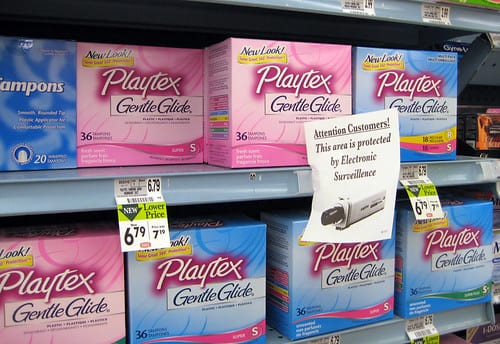The cost of being a woman
TNJN contributor, Emma Coffey, discusses and debates the seemingly unfair tampon tax.

When I was 13, I was surprised with my first period. My mom, being unprepared, drove to the store and bought the necessary products for me. From that day until I went to college, she bought me period products anytime I needed them.
Acquiring feminine hygiene products is not that effortless for other women around the world.
The lack of access to feminine hygiene products is a global issue: Low-income women and even teenagers must decide between feeding their families and buying period products. In the United States, 11% of boys and men and 14% of girls and women live below the poverty line; this percentage is greatest during a woman’s menstruating years, according to one study.
COVID-19 has made access even more challenging. So, why do countless women struggle to obtain these necessary products?
The tampon tax is a sales tax on female hygiene products because they are deemed a luxury good by state legislators. This tax makes tampons and other products that are necessary during a woman’s menstrual cycle more challenging to buy. One in five teenagers, ages 13 to 19, have struggled to obtain or cannot afford period products, according to a study done by Thinx and the nonprofit PERIOD.
Purses, sunglasses, Manolo Blahniks – sure. But tampons? They are as essential as toilet paper and should be classified as such.
Low-income women who cannot afford hygiene products have to use rags or paper towels during their cycle or leave tampons in for a long time, which increases the chances of infection among women and teens. Sixty-one percent of girls have worn a tampon or pad for more than four hours, according to the Thinx and PERIOD study.
Perhaps most distressing is that some girls miss out on their education because they do not have the products. Four in five students missed class time or know someone who missed class time because they did not have access to period products, according to a study. Women should not have to miss out on their education because of the price of tampons.
In an informal survey I conducted with 62 women at the University of Tennessee, 100% believed that period products in Tennessee are overpriced. To tax essential products, like pads, tampons — and also food — is considered regressive by many. It widens the socioeconomic divide.
“As a full-time student who works 30 to 35 hours weekly to make ends meet, I typically think of expenses in terms of ‘how many hours of work does this cost equal out to?” UTK senior, Mary-Margaret Murray, said. “It’s pretty frustrating when my monthly period products equal out to two hours’ worth of my pay because those two hours are so valuable for a student.”
Women in the United States are paying $150 million per year on menstrual products. This means that in a span of 33 years, a woman would have spent about $4,752, assuming each piece of pads or tampons is $0.60 cents.
Kenya was the first country to remove the tax on tampons and pads in 2004, and not many countries have since followed Kenya’s legislation. However, on Jan. 1, 2021, the U.K. abolished the tampon tax and deemed these products essential to the health of women.
In the United States, 33 states still have sales tax on feminine hygiene products. However, in states such as New Jersey and Massachusetts, these products are an exception for health care.
Tennessee is one of the many states that does have a sales tax placed on feminine hygiene products. The tax rate for hygiene products in Tennessee is 7%, according to a proposed bill’s fiscal note. This means that women in Tennessee are spending around $120 each year on period products.
In February 2020, Tennessee legislators decided that novelty children’s costumes and cowboy hats are more of a necessity than tampons. For a sales-tax-free weekend, a bill that would have made tampons tax-free for three days was denied.
“I would think since it’s a sales tax holiday, there’s really no limit on the number of items anybody can purchase. I don’t know how you would limit the number of items someone could purchase,” GOP representative, Sen. Joey Hensley, said in a debate over the bill.
Hensley declined to comment on this article.
Tennessee GOP lawmakers pushed back on this proposal because they were worried women would abuse this freedom and overbuy feminine products.
This means that I must pay more than I should for menstrual products because male legislators fear that women will splurge on them.
As a woman, it makes me question that if men were in the same position as women, would this even be a discussion?
Being a woman is costly even without the tampon tax; women are already grappling with a $0.80 wage gap.
State legislators need to remove the tampon tax and free women from paying a tax on something that is completely out of their hands.
Edited by Maddie Torres and Ryan Sylvia
Featured Image courtesy of Creative Commons
